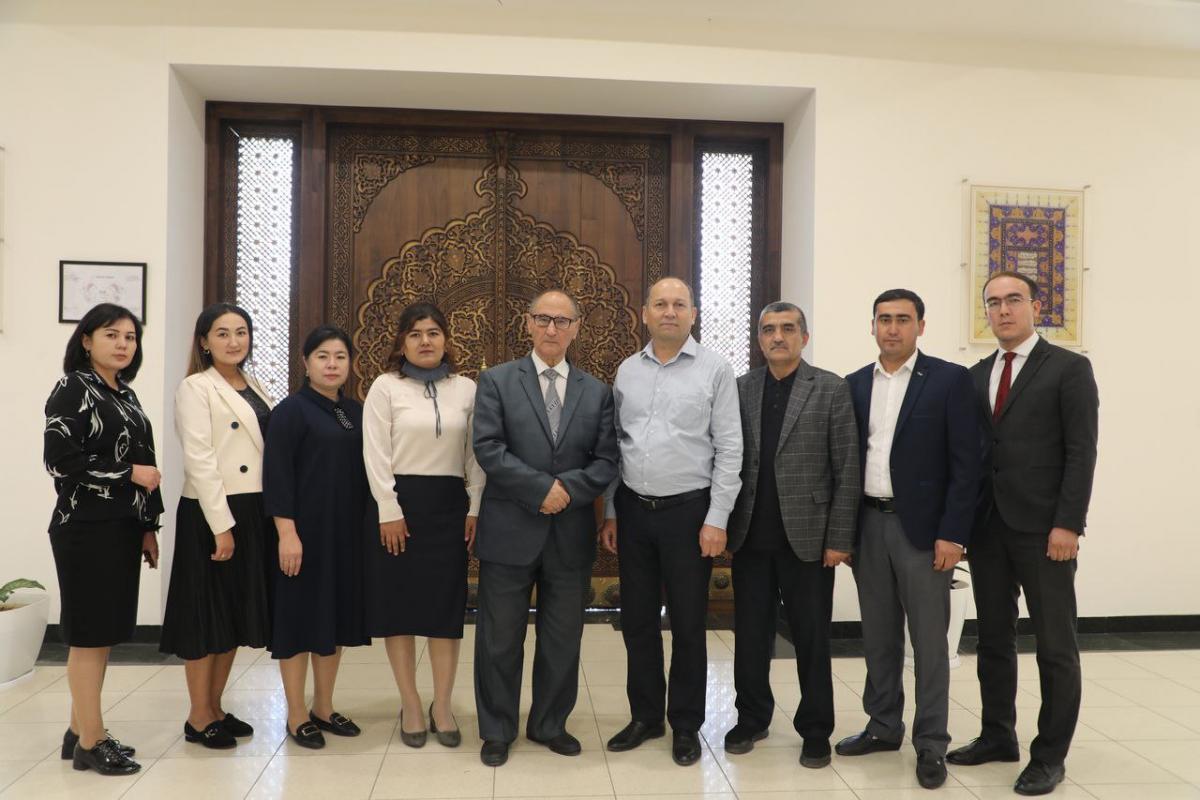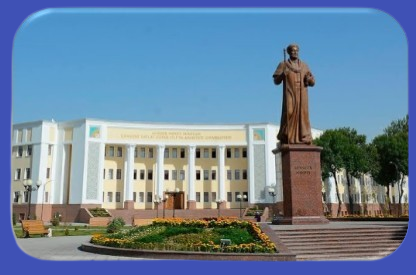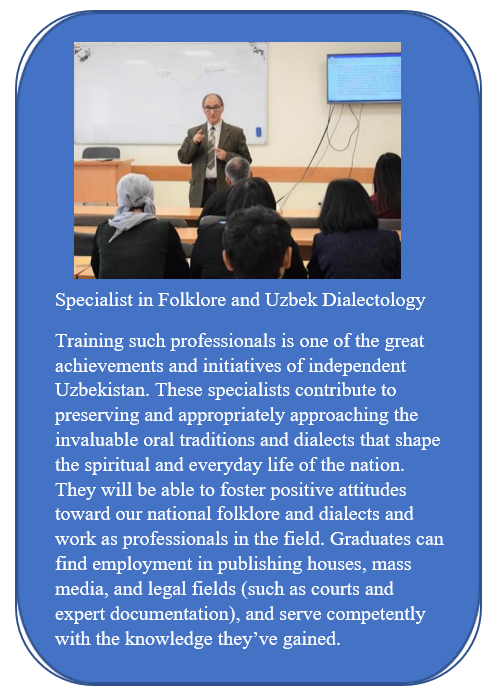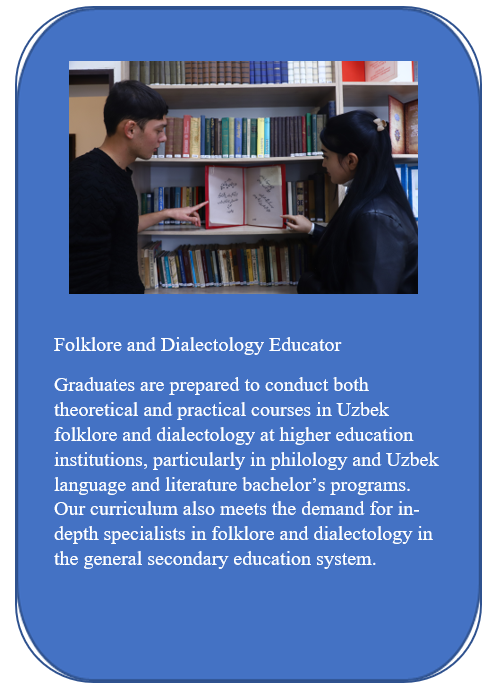This specialization is dedicated to training qualified professionals in the fields of folklore studies and dialectology. It focuses on developing knowledge and skills related to Uzbek folklore, folk epics, oral traditions, written literature, Uzbek dialects, the relationship between literary language and dialects, and areal linguistics. The program requirements aim to enhance students’ linguistic knowledge and provide them with specialized knowledge necessary for understanding the culture and customs of the Uzbek people, the origins and current scientific significance of dialects, the influence of dialects on the Uzbek literary language, and the preservation and development of national values in folklore.
Director of Academic Program
Professor Samixon Ashirboyev
Study Mode
Two years full-time.
Program Structure
Qualification for this award requires the successful completion of 120 credit points including the subjects listed in the recommended sequence below.

Modular Learning
Launching in 2025
Alisher Navoi Tashkent State University of Uzbek Language and Literature (TSUULL) is set to introduce modular learning at the University starting in 2025, offering a flexible and innovative approach to education.

Master’s program in Folklore Studies and Dialectology Specialization
During the academic process, students will receive comprehensive information about the formation and spread of Uzbek folklore and dialects, their areal characteristics, the Methodology (technology) of creating linguistic maps and an atlas of Uzbek folklore and dialects, the language and poetics of folk epics, ceremonial folklore, Uzbek myths and legends, children's folklore, the history of research on Uzbek dialects, the relationship between the literary language and dialects, and the sources of enrichment of the literary language. They will acquire both theoretical and practical training in these areas.
Flexible and Balanced Schedule
Classes are held on campus for five hours a day, five days a week, allowing you to balance studies with other commitments. Over the year, you’ll complete about 7 subjects. There are also online preparatory courses lasting
17 weeks, with one in-person class every two weeks, to help build your confidence and ease you into academic or professional life.
This subject forms general concepts related to understanding the scientific problems of folklore studies and dialectology, conducting scientific and practical research, educational standards, processing experimental results and drawing scientifically based conclusions from them, preparing and editing scientific articles, organizing and conducting scientific seminars, conferences, and symposiums, and developing scientific project skills.
This course discusses the artistic qualities, plot, composition, depiction of emotions, and artistic imagery in samples of oral folk literature, which are an inseparable part of our national and spiritual values. It covers the artistry of folk works, bardic traditions, children's folklore, ceremonial folklore, and the poetics of folk songs.
This course studies the theoretical issues of folklore studies, offering a comprehensive view of the main topics in Uzbek folklore scholarship. It teaches how to research Uzbek folklore materials based on comparative folklore studies and provides academic knowledge to master's students. The course also shows how mythological plots, images, and elements are artistically and aesthetically represented in folk prose and songs.
This subject explores the areal features of the Uzbek language, types and methods of studying linguistic areas, isoglosses, taxons and taxonomy, innovation in areal linguistics, contact linguistics, linguistic and dialectal zones, dialectal areas of the Uzbek language, linguistic maps and atlases, geographic dialectal continua, social dialectal continua, the systematics of languages and dialects, clusters, foundations of linguistic geography, and the development of areal linguistics in Central Asia.
This course covers teaching methods and technologies, including their design. It discusses the specific aspects of teaching folklore works and linguistic subjects, particularly dialectology. Topics include curriculum development, syllabi, calendar planning, textbooks and manuals, working with transcription systems, the Xemis system, organizing lectures, practical and seminar sessions, as well as students' independent work. The course also covers methods for assessing students' knowledge, skills, and competencies.
This subject covers the historical stages of studying Uzbek dialects—from the early and medieval periods to the 19th and 20th centuries. It discusses dialectological research of the 1920s, the dialectological views of Mahmud al-Kashgari and Alisher Navoi, studies by foreign scholars, the role of the Jadids in the development of dialectology, and the theories and practical works of researchers like G.O. Yunus, K.K. Yudakhin, Y.D. Polivanov, and V.V. Reshetov. It also covers the formation of Uzbek dialectology as a science and the emergence of a generation of Uzbek dialectologists such as Sh. Shoabdurahmonov, F. Abdullayev, S. Ibrohimov, M. Mirzayev, O. Madrahimov, Kh. Doniyorov, A. Aliyev, A. Shermatov, and others. Additionally, it analyzes research on Karluk, Oghuz, and Kipchak dialects and the factors for modernizing Uzbek dialect research.
This course covers myths and mythological perceptions. It explores the classification of myths, including animism, totemism, and fetishism. The relationship between myths and ritual folklore is examined, including seasonal and family rituals and their mythological connections. The course delves into mythological and artistic-aesthetic thinking, the nature and artistry of mythological legends, and the connection between myth and epic. It also addresses the mythological layers in fairy tales and the broad meanings related to them, as well as mythological worldviews expressed in proverbs and riddles. It investigates the expression of mythological perspectives in proverbs and how the hidden objects and images in riddles are linked to mythological concepts. Topics also include the connection between myth and performing arts, and the interrelation of myth, religion, and literature. The course analyzes the artistic-aesthetic functions of seasonal rituals and ritual myths in samples of folk performing arts, emphasizing that mythological thinking has always stood at the origin of literature and art. The course explores the concept of layered “worlds” in Uzbek mythology, the interpretation of rituals associated with the “Yada” stone, and mythological aspects in the Orkhon-Enisei inscriptions. It examines ancient written sources of Uzbek mythology, analyzes myth-related words in Mahmud al-Kashgari’s Devon-u Lug‘at-it-Turk, and studies the links between Alisher Navoi and folk creativity. Central mythologemes such as the “Tree of Life” and “Water of Life” are also covered, along with mythological imagery in ancient Turkic texts and the cult of animals in Uzbek mythology. The course concludes with an analysis of the “three-layered” world model in Uzbek mythology.
Career Opportunities
This program is designed to develop skills in studying folkloric creativity and Uzbek dialects, enhance scientific thinking, and train students in recording folklore and dialectal features using both modern technical means and traditional methods. It prepares students for scientific work both theoretically and practically. Additionally, the program lays a solid foundation for graduates to pursue pedagogical careers successfully in higher education institutions.
The program enables graduates to work effectively in publishing, academia, and related fields connected to folklore and dialectology. It also equips them with the ability to contribute to the development of related disciplines throughout the learning process.


Indicative annual fee
$2000*
This indicative annual fee is based on one year study load of 14subjects (68 credit points)
If you are a domestic student, you can apply through our TSUULL Application system which is free of charge.
Domestic students are:
At Alisher Navo’i Tashkent State University of Uzbek Language and Literature, we are proud to offer a range of scholarships that acknowledge students with a deep commitment to the Uzbek language, literature, and culture. Our scholarships reward those who demonstrate academic excellence, active engagement within their communities, and outstanding leadership. Through donor-funded support, we also ensure that scholarships are accessible to students based on their academic achievements and financial needs. Additionally, specific scholarships are available for degrees in translation, linguistics, and Uzbek literature, fostering excellence and dedication to advancing Uzbek language and literature studies.
1. How long is the Master’s program?
The bachelor’s program is 2 years (full-time). Students complete a structured curriculum that builds on foundational courses in language and literature while allowing for specialization in later years.
2. How are assessments conducted?
Assessment in TSUULL's bachelor’s programs is diverse and may include exams, portfolios, project work, fieldwork, and practical tasks. The programs focus on authentic assessments to reflect real-world applications, with many tasks designed to develop essential skills like critical thinking, research, and time management. Additionally, teachers offer individual support through small, interactive classes, ensuring students have ample guidance throughout their studies.
3.What career opportunities are available after graduation?
A TSUULL Master’s degree opens doors to careers in education, translation, international relations, cultural institutions, and more. Graduates often find roles in translation and interpretation, publishing, media, and tourism, with their language skills and cultural knowledge highly valued by employers worldwide.
4. Are there scholarships available for foreign students?
Yes, TSUULL offers scholarships for international students based on academic performance and other achievements. Students interested in scholarships should apply early and check with the admissions office to understand the specific requirements and availability.
5.Does TSUULL offer internship or study abroad opportunities?
TSUULL has partnerships with universities and institutions abroad, allowing students to participate in exchange programs and internships. These opportunities provide valuable experience in different cultural and linguistic settings, often aligning with students’ studies and future career goals.
TSUULL has been included in the QS World University Rankings 2025, earning a spot in the 301–350 range in the Modern Languages category.
This recognition reflects the university’s strong performance in areas such as academic reputation, employer opinion, research output, and international collaboration.